Volunteer Hiring: Leadership & Management in Nonprofit Research
VerifiedAdded on 2023/06/14
|16
|5473
|166
Report
AI Summary
This report presents a research methodology for studying leadership and management in nonprofit organizations, focusing on the hiring of volunteers. The chosen research philosophy is interpretivism, which emphasizes the subjective experiences and social interactions of individuals. Qualitative research methods, particularly interviews, are employed to gather in-depth data. The inductive research approach is selected for its flexibility and ability to develop new theories grounded in the research context. Purposive sampling is used to recruit participants who can provide detailed insights into the research topic. The report details the research design, administration, and ethical considerations, aiming to provide valuable information for comparable nonprofits.
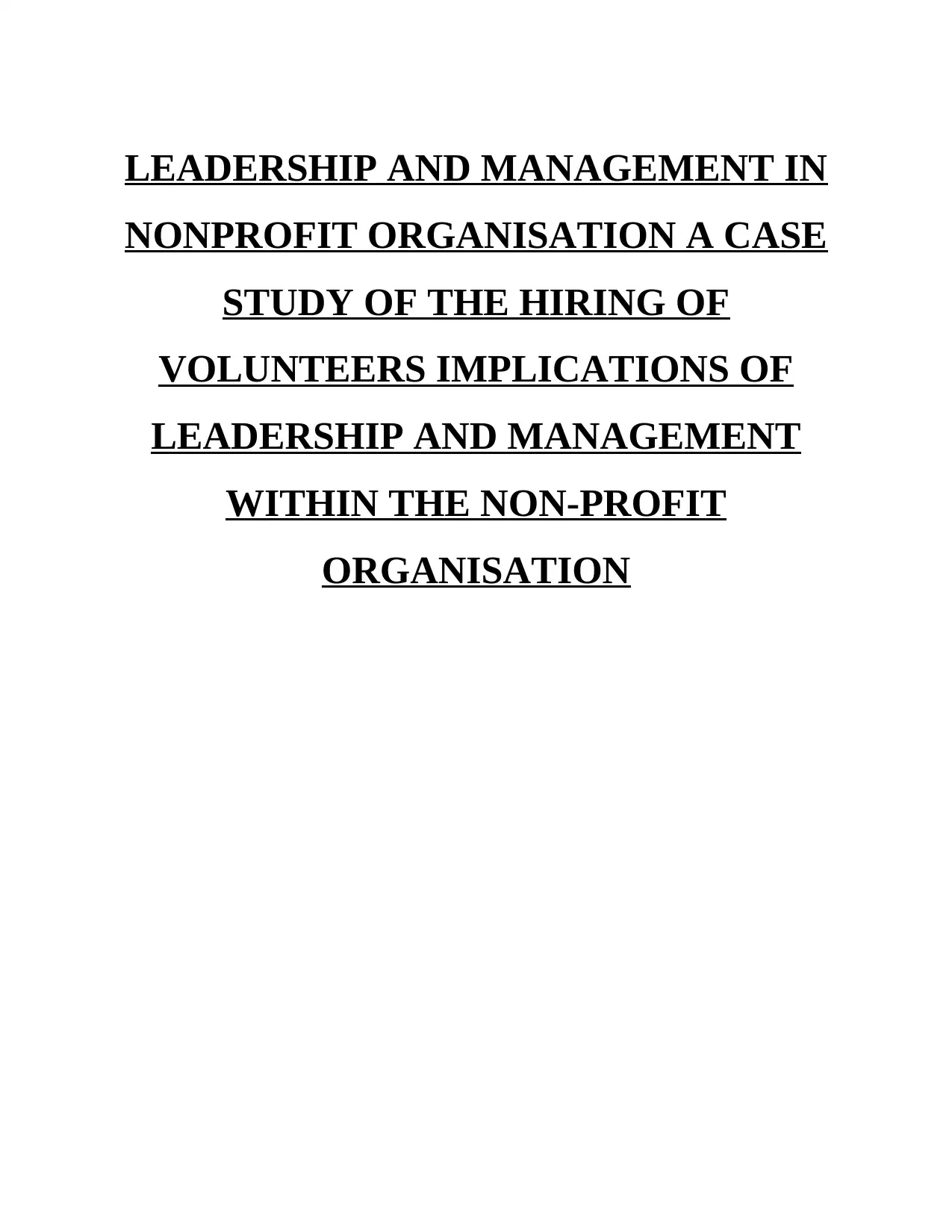
LEADERSHIP AND MANAGEMENT IN
NONPROFIT ORGANISATION A CASE
STUDY OF THE HIRING OF
VOLUNTEERS IMPLICATIONS OF
LEADERSHIP AND MANAGEMENT
WITHIN THE NON-PROFIT
ORGANISATION
NONPROFIT ORGANISATION A CASE
STUDY OF THE HIRING OF
VOLUNTEERS IMPLICATIONS OF
LEADERSHIP AND MANAGEMENT
WITHIN THE NON-PROFIT
ORGANISATION
Paraphrase This Document
Need a fresh take? Get an instant paraphrase of this document with our AI Paraphraser
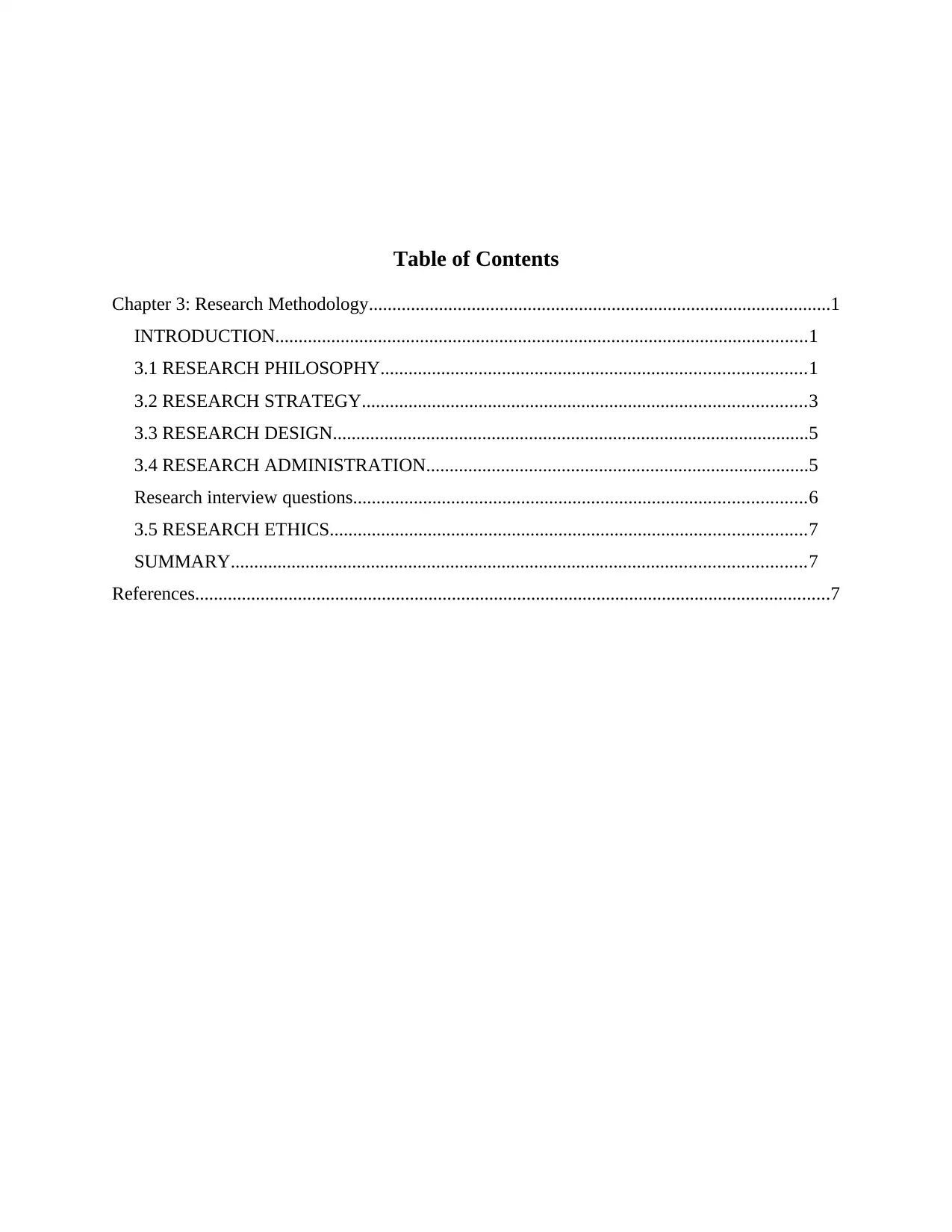
Table of Contents
Chapter 3: Research Methodology...................................................................................................1
INTRODUCTION..................................................................................................................1
3.1 RESEARCH PHILOSOPHY...........................................................................................1
3.2 RESEARCH STRATEGY...............................................................................................3
3.3 RESEARCH DESIGN......................................................................................................5
3.4 RESEARCH ADMINISTRATION..................................................................................5
Research interview questions.................................................................................................6
3.5 RESEARCH ETHICS......................................................................................................7
SUMMARY...........................................................................................................................7
References........................................................................................................................................7
Chapter 3: Research Methodology...................................................................................................1
INTRODUCTION..................................................................................................................1
3.1 RESEARCH PHILOSOPHY...........................................................................................1
3.2 RESEARCH STRATEGY...............................................................................................3
3.3 RESEARCH DESIGN......................................................................................................5
3.4 RESEARCH ADMINISTRATION..................................................................................5
Research interview questions.................................................................................................6
3.5 RESEARCH ETHICS......................................................................................................7
SUMMARY...........................................................................................................................7
References........................................................................................................................................7
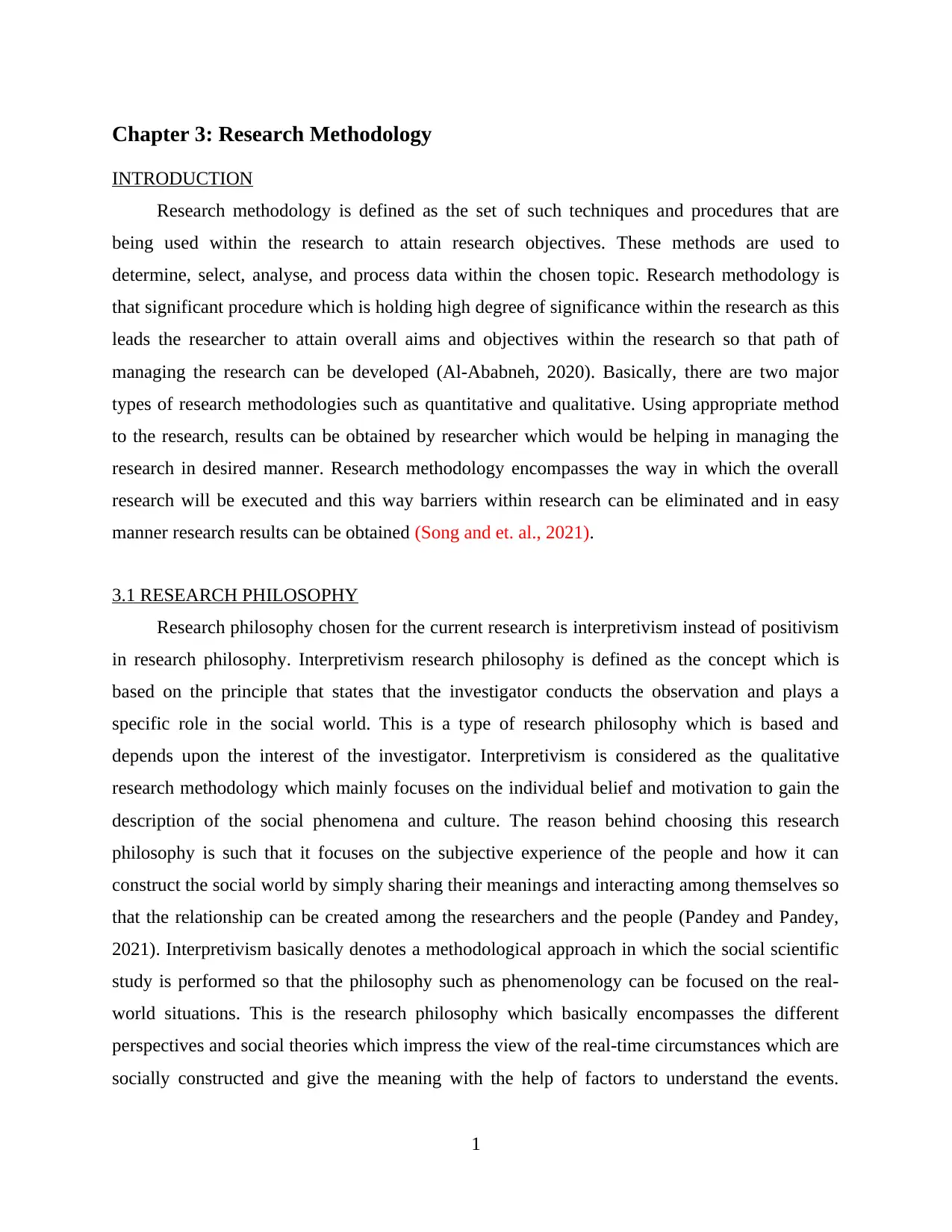
Chapter 3: Research Methodology
INTRODUCTION
Research methodology is defined as the set of such techniques and procedures that are
being used within the research to attain research objectives. These methods are used to
determine, select, analyse, and process data within the chosen topic. Research methodology is
that significant procedure which is holding high degree of significance within the research as this
leads the researcher to attain overall aims and objectives within the research so that path of
managing the research can be developed (Al-Ababneh, 2020). Basically, there are two major
types of research methodologies such as quantitative and qualitative. Using appropriate method
to the research, results can be obtained by researcher which would be helping in managing the
research in desired manner. Research methodology encompasses the way in which the overall
research will be executed and this way barriers within research can be eliminated and in easy
manner research results can be obtained (Song and et. al., 2021).
3.1 RESEARCH PHILOSOPHY
Research philosophy chosen for the current research is interpretivism instead of positivism
in research philosophy. Interpretivism research philosophy is defined as the concept which is
based on the principle that states that the investigator conducts the observation and plays a
specific role in the social world. This is a type of research philosophy which is based and
depends upon the interest of the investigator. Interpretivism is considered as the qualitative
research methodology which mainly focuses on the individual belief and motivation to gain the
description of the social phenomena and culture. The reason behind choosing this research
philosophy is such that it focuses on the subjective experience of the people and how it can
construct the social world by simply sharing their meanings and interacting among themselves so
that the relationship can be created among the researchers and the people (Pandey and Pandey,
2021). Interpretivism basically denotes a methodological approach in which the social scientific
study is performed so that the philosophy such as phenomenology can be focused on the real-
world situations. This is the research philosophy which basically encompasses the different
perspectives and social theories which impress the view of the real-time circumstances which are
socially constructed and give the meaning with the help of factors to understand the events.
1
INTRODUCTION
Research methodology is defined as the set of such techniques and procedures that are
being used within the research to attain research objectives. These methods are used to
determine, select, analyse, and process data within the chosen topic. Research methodology is
that significant procedure which is holding high degree of significance within the research as this
leads the researcher to attain overall aims and objectives within the research so that path of
managing the research can be developed (Al-Ababneh, 2020). Basically, there are two major
types of research methodologies such as quantitative and qualitative. Using appropriate method
to the research, results can be obtained by researcher which would be helping in managing the
research in desired manner. Research methodology encompasses the way in which the overall
research will be executed and this way barriers within research can be eliminated and in easy
manner research results can be obtained (Song and et. al., 2021).
3.1 RESEARCH PHILOSOPHY
Research philosophy chosen for the current research is interpretivism instead of positivism
in research philosophy. Interpretivism research philosophy is defined as the concept which is
based on the principle that states that the investigator conducts the observation and plays a
specific role in the social world. This is a type of research philosophy which is based and
depends upon the interest of the investigator. Interpretivism is considered as the qualitative
research methodology which mainly focuses on the individual belief and motivation to gain the
description of the social phenomena and culture. The reason behind choosing this research
philosophy is such that it focuses on the subjective experience of the people and how it can
construct the social world by simply sharing their meanings and interacting among themselves so
that the relationship can be created among the researchers and the people (Pandey and Pandey,
2021). Interpretivism basically denotes a methodological approach in which the social scientific
study is performed so that the philosophy such as phenomenology can be focused on the real-
world situations. This is the research philosophy which basically encompasses the different
perspectives and social theories which impress the view of the real-time circumstances which are
socially constructed and give the meaning with the help of factors to understand the events.
1
⊘ This is a preview!⊘
Do you want full access?
Subscribe today to unlock all pages.

Trusted by 1+ million students worldwide
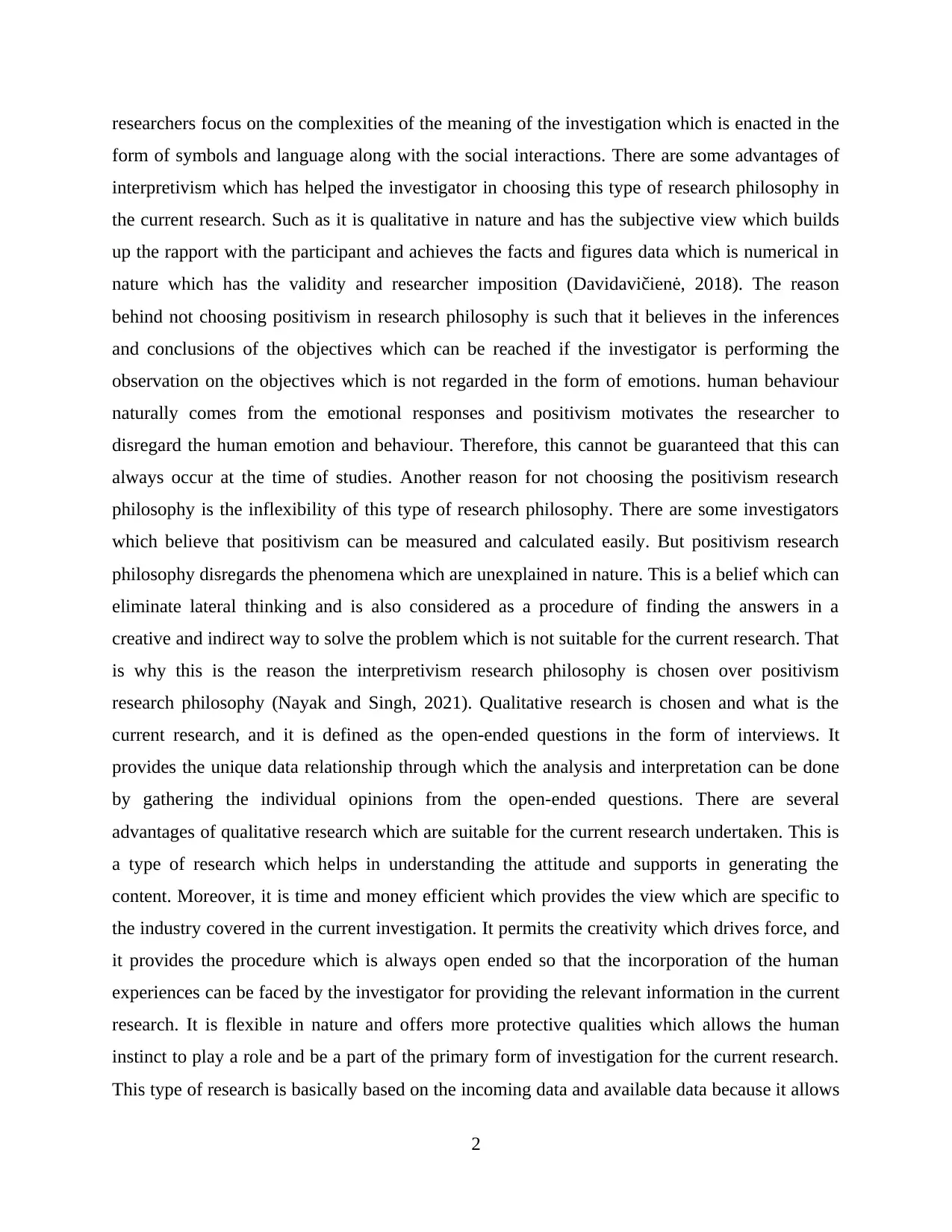
researchers focus on the complexities of the meaning of the investigation which is enacted in the
form of symbols and language along with the social interactions. There are some advantages of
interpretivism which has helped the investigator in choosing this type of research philosophy in
the current research. Such as it is qualitative in nature and has the subjective view which builds
up the rapport with the participant and achieves the facts and figures data which is numerical in
nature which has the validity and researcher imposition (Davidavičienė, 2018). The reason
behind not choosing positivism in research philosophy is such that it believes in the inferences
and conclusions of the objectives which can be reached if the investigator is performing the
observation on the objectives which is not regarded in the form of emotions. human behaviour
naturally comes from the emotional responses and positivism motivates the researcher to
disregard the human emotion and behaviour. Therefore, this cannot be guaranteed that this can
always occur at the time of studies. Another reason for not choosing the positivism research
philosophy is the inflexibility of this type of research philosophy. There are some investigators
which believe that positivism can be measured and calculated easily. But positivism research
philosophy disregards the phenomena which are unexplained in nature. This is a belief which can
eliminate lateral thinking and is also considered as a procedure of finding the answers in a
creative and indirect way to solve the problem which is not suitable for the current research. That
is why this is the reason the interpretivism research philosophy is chosen over positivism
research philosophy (Nayak and Singh, 2021). Qualitative research is chosen and what is the
current research, and it is defined as the open-ended questions in the form of interviews. It
provides the unique data relationship through which the analysis and interpretation can be done
by gathering the individual opinions from the open-ended questions. There are several
advantages of qualitative research which are suitable for the current research undertaken. This is
a type of research which helps in understanding the attitude and supports in generating the
content. Moreover, it is time and money efficient which provides the view which are specific to
the industry covered in the current investigation. It permits the creativity which drives force, and
it provides the procedure which is always open ended so that the incorporation of the human
experiences can be faced by the investigator for providing the relevant information in the current
research. It is flexible in nature and offers more protective qualities which allows the human
instinct to play a role and be a part of the primary form of investigation for the current research.
This type of research is basically based on the incoming data and available data because it allows
2
form of symbols and language along with the social interactions. There are some advantages of
interpretivism which has helped the investigator in choosing this type of research philosophy in
the current research. Such as it is qualitative in nature and has the subjective view which builds
up the rapport with the participant and achieves the facts and figures data which is numerical in
nature which has the validity and researcher imposition (Davidavičienė, 2018). The reason
behind not choosing positivism in research philosophy is such that it believes in the inferences
and conclusions of the objectives which can be reached if the investigator is performing the
observation on the objectives which is not regarded in the form of emotions. human behaviour
naturally comes from the emotional responses and positivism motivates the researcher to
disregard the human emotion and behaviour. Therefore, this cannot be guaranteed that this can
always occur at the time of studies. Another reason for not choosing the positivism research
philosophy is the inflexibility of this type of research philosophy. There are some investigators
which believe that positivism can be measured and calculated easily. But positivism research
philosophy disregards the phenomena which are unexplained in nature. This is a belief which can
eliminate lateral thinking and is also considered as a procedure of finding the answers in a
creative and indirect way to solve the problem which is not suitable for the current research. That
is why this is the reason the interpretivism research philosophy is chosen over positivism
research philosophy (Nayak and Singh, 2021). Qualitative research is chosen and what is the
current research, and it is defined as the open-ended questions in the form of interviews. It
provides the unique data relationship through which the analysis and interpretation can be done
by gathering the individual opinions from the open-ended questions. There are several
advantages of qualitative research which are suitable for the current research undertaken. This is
a type of research which helps in understanding the attitude and supports in generating the
content. Moreover, it is time and money efficient which provides the view which are specific to
the industry covered in the current investigation. It permits the creativity which drives force, and
it provides the procedure which is always open ended so that the incorporation of the human
experiences can be faced by the investigator for providing the relevant information in the current
research. It is flexible in nature and offers more protective qualities which allows the human
instinct to play a role and be a part of the primary form of investigation for the current research.
This type of research is basically based on the incoming data and available data because it allows
2
Paraphrase This Document
Need a fresh take? Get an instant paraphrase of this document with our AI Paraphraser
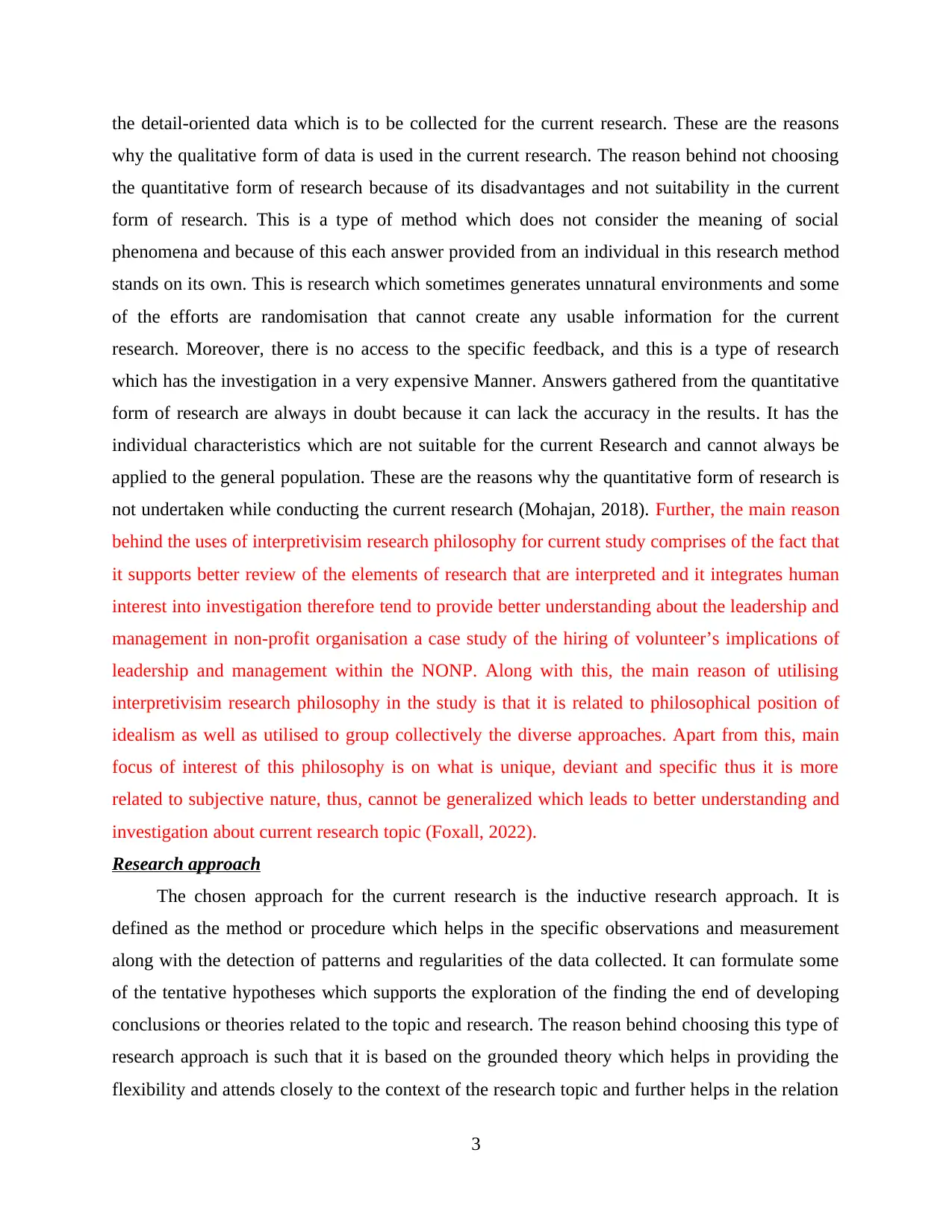
the detail-oriented data which is to be collected for the current research. These are the reasons
why the qualitative form of data is used in the current research. The reason behind not choosing
the quantitative form of research because of its disadvantages and not suitability in the current
form of research. This is a type of method which does not consider the meaning of social
phenomena and because of this each answer provided from an individual in this research method
stands on its own. This is research which sometimes generates unnatural environments and some
of the efforts are randomisation that cannot create any usable information for the current
research. Moreover, there is no access to the specific feedback, and this is a type of research
which has the investigation in a very expensive Manner. Answers gathered from the quantitative
form of research are always in doubt because it can lack the accuracy in the results. It has the
individual characteristics which are not suitable for the current Research and cannot always be
applied to the general population. These are the reasons why the quantitative form of research is
not undertaken while conducting the current research (Mohajan, 2018). Further, the main reason
behind the uses of interpretivisim research philosophy for current study comprises of the fact that
it supports better review of the elements of research that are interpreted and it integrates human
interest into investigation therefore tend to provide better understanding about the leadership and
management in non-profit organisation a case study of the hiring of volunteer’s implications of
leadership and management within the NONP. Along with this, the main reason of utilising
interpretivisim research philosophy in the study is that it is related to philosophical position of
idealism as well as utilised to group collectively the diverse approaches. Apart from this, main
focus of interest of this philosophy is on what is unique, deviant and specific thus it is more
related to subjective nature, thus, cannot be generalized which leads to better understanding and
investigation about current research topic (Foxall, 2022).
Research approach
The chosen approach for the current research is the inductive research approach. It is
defined as the method or procedure which helps in the specific observations and measurement
along with the detection of patterns and regularities of the data collected. It can formulate some
of the tentative hypotheses which supports the exploration of the finding the end of developing
conclusions or theories related to the topic and research. The reason behind choosing this type of
research approach is such that it is based on the grounded theory which helps in providing the
flexibility and attends closely to the context of the research topic and further helps in the relation
3
why the qualitative form of data is used in the current research. The reason behind not choosing
the quantitative form of research because of its disadvantages and not suitability in the current
form of research. This is a type of method which does not consider the meaning of social
phenomena and because of this each answer provided from an individual in this research method
stands on its own. This is research which sometimes generates unnatural environments and some
of the efforts are randomisation that cannot create any usable information for the current
research. Moreover, there is no access to the specific feedback, and this is a type of research
which has the investigation in a very expensive Manner. Answers gathered from the quantitative
form of research are always in doubt because it can lack the accuracy in the results. It has the
individual characteristics which are not suitable for the current Research and cannot always be
applied to the general population. These are the reasons why the quantitative form of research is
not undertaken while conducting the current research (Mohajan, 2018). Further, the main reason
behind the uses of interpretivisim research philosophy for current study comprises of the fact that
it supports better review of the elements of research that are interpreted and it integrates human
interest into investigation therefore tend to provide better understanding about the leadership and
management in non-profit organisation a case study of the hiring of volunteer’s implications of
leadership and management within the NONP. Along with this, the main reason of utilising
interpretivisim research philosophy in the study is that it is related to philosophical position of
idealism as well as utilised to group collectively the diverse approaches. Apart from this, main
focus of interest of this philosophy is on what is unique, deviant and specific thus it is more
related to subjective nature, thus, cannot be generalized which leads to better understanding and
investigation about current research topic (Foxall, 2022).
Research approach
The chosen approach for the current research is the inductive research approach. It is
defined as the method or procedure which helps in the specific observations and measurement
along with the detection of patterns and regularities of the data collected. It can formulate some
of the tentative hypotheses which supports the exploration of the finding the end of developing
conclusions or theories related to the topic and research. The reason behind choosing this type of
research approach is such that it is based on the grounded theory which helps in providing the
flexibility and attends closely to the context of the research topic and further helps in the relation
3
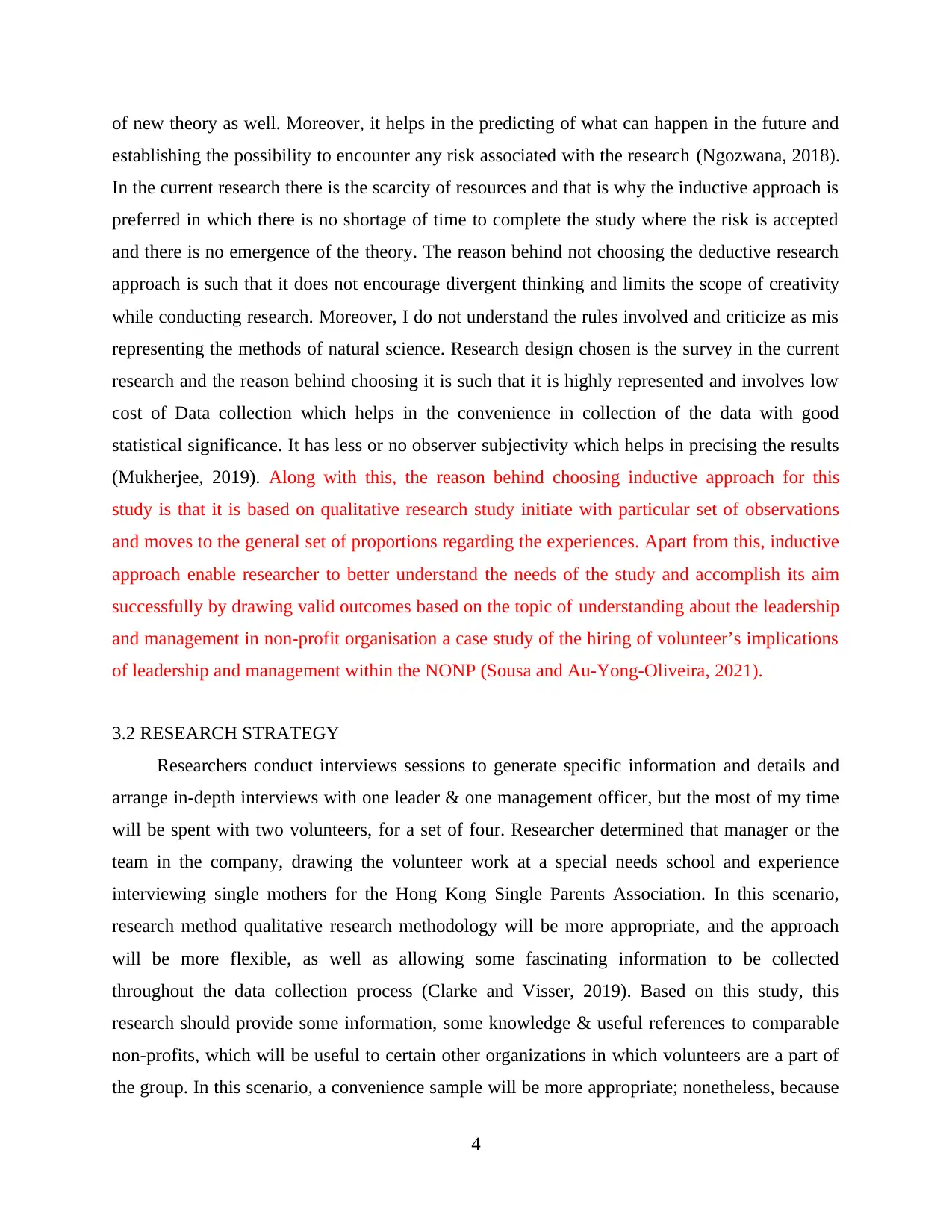
of new theory as well. Moreover, it helps in the predicting of what can happen in the future and
establishing the possibility to encounter any risk associated with the research (Ngozwana, 2018).
In the current research there is the scarcity of resources and that is why the inductive approach is
preferred in which there is no shortage of time to complete the study where the risk is accepted
and there is no emergence of the theory. The reason behind not choosing the deductive research
approach is such that it does not encourage divergent thinking and limits the scope of creativity
while conducting research. Moreover, I do not understand the rules involved and criticize as mis
representing the methods of natural science. Research design chosen is the survey in the current
research and the reason behind choosing it is such that it is highly represented and involves low
cost of Data collection which helps in the convenience in collection of the data with good
statistical significance. It has less or no observer subjectivity which helps in precising the results
(Mukherjee, 2019). Along with this, the reason behind choosing inductive approach for this
study is that it is based on qualitative research study initiate with particular set of observations
and moves to the general set of proportions regarding the experiences. Apart from this, inductive
approach enable researcher to better understand the needs of the study and accomplish its aim
successfully by drawing valid outcomes based on the topic of understanding about the leadership
and management in non-profit organisation a case study of the hiring of volunteer’s implications
of leadership and management within the NONP (Sousa and Au-Yong-Oliveira, 2021).
3.2 RESEARCH STRATEGY
Researchers conduct interviews sessions to generate specific information and details and
arrange in-depth interviews with one leader & one management officer, but the most of my time
will be spent with two volunteers, for a set of four. Researcher determined that manager or the
team in the company, drawing the volunteer work at a special needs school and experience
interviewing single mothers for the Hong Kong Single Parents Association. In this scenario,
research method qualitative research methodology will be more appropriate, and the approach
will be more flexible, as well as allowing some fascinating information to be collected
throughout the data collection process (Clarke and Visser, 2019). Based on this study, this
research should provide some information, some knowledge & useful references to comparable
non-profits, which will be useful to certain other organizations in which volunteers are a part of
the group. In this scenario, a convenience sample will be more appropriate; nonetheless, because
4
establishing the possibility to encounter any risk associated with the research (Ngozwana, 2018).
In the current research there is the scarcity of resources and that is why the inductive approach is
preferred in which there is no shortage of time to complete the study where the risk is accepted
and there is no emergence of the theory. The reason behind not choosing the deductive research
approach is such that it does not encourage divergent thinking and limits the scope of creativity
while conducting research. Moreover, I do not understand the rules involved and criticize as mis
representing the methods of natural science. Research design chosen is the survey in the current
research and the reason behind choosing it is such that it is highly represented and involves low
cost of Data collection which helps in the convenience in collection of the data with good
statistical significance. It has less or no observer subjectivity which helps in precising the results
(Mukherjee, 2019). Along with this, the reason behind choosing inductive approach for this
study is that it is based on qualitative research study initiate with particular set of observations
and moves to the general set of proportions regarding the experiences. Apart from this, inductive
approach enable researcher to better understand the needs of the study and accomplish its aim
successfully by drawing valid outcomes based on the topic of understanding about the leadership
and management in non-profit organisation a case study of the hiring of volunteer’s implications
of leadership and management within the NONP (Sousa and Au-Yong-Oliveira, 2021).
3.2 RESEARCH STRATEGY
Researchers conduct interviews sessions to generate specific information and details and
arrange in-depth interviews with one leader & one management officer, but the most of my time
will be spent with two volunteers, for a set of four. Researcher determined that manager or the
team in the company, drawing the volunteer work at a special needs school and experience
interviewing single mothers for the Hong Kong Single Parents Association. In this scenario,
research method qualitative research methodology will be more appropriate, and the approach
will be more flexible, as well as allowing some fascinating information to be collected
throughout the data collection process (Clarke and Visser, 2019). Based on this study, this
research should provide some information, some knowledge & useful references to comparable
non-profits, which will be useful to certain other organizations in which volunteers are a part of
the group. In this scenario, a convenience sample will be more appropriate; nonetheless, because
4
⊘ This is a preview!⊘
Do you want full access?
Subscribe today to unlock all pages.

Trusted by 1+ million students worldwide
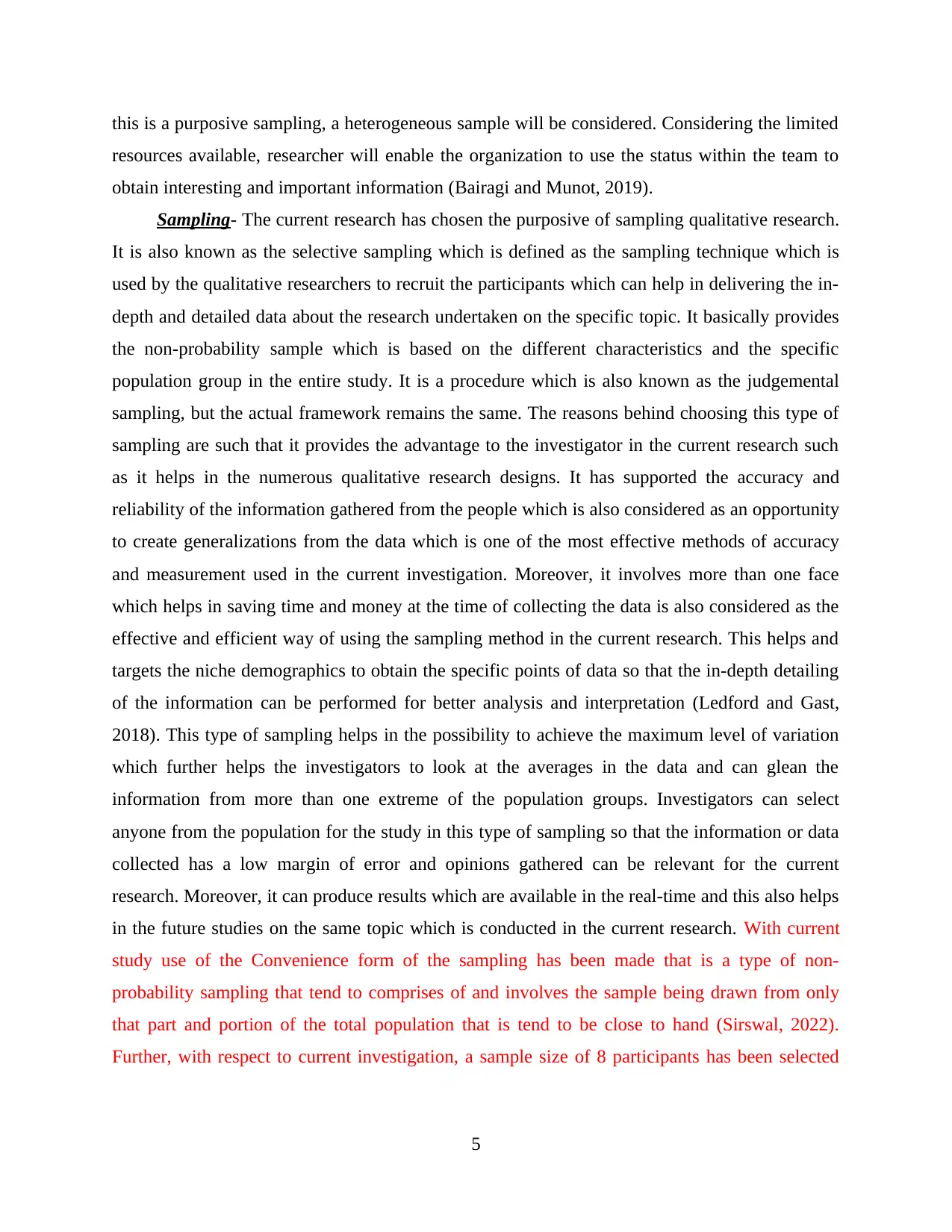
this is a purposive sampling, a heterogeneous sample will be considered. Considering the limited
resources available, researcher will enable the organization to use the status within the team to
obtain interesting and important information (Bairagi and Munot, 2019).
Sampling- The current research has chosen the purposive of sampling qualitative research.
It is also known as the selective sampling which is defined as the sampling technique which is
used by the qualitative researchers to recruit the participants which can help in delivering the in-
depth and detailed data about the research undertaken on the specific topic. It basically provides
the non-probability sample which is based on the different characteristics and the specific
population group in the entire study. It is a procedure which is also known as the judgemental
sampling, but the actual framework remains the same. The reasons behind choosing this type of
sampling are such that it provides the advantage to the investigator in the current research such
as it helps in the numerous qualitative research designs. It has supported the accuracy and
reliability of the information gathered from the people which is also considered as an opportunity
to create generalizations from the data which is one of the most effective methods of accuracy
and measurement used in the current investigation. Moreover, it involves more than one face
which helps in saving time and money at the time of collecting the data is also considered as the
effective and efficient way of using the sampling method in the current research. This helps and
targets the niche demographics to obtain the specific points of data so that the in-depth detailing
of the information can be performed for better analysis and interpretation (Ledford and Gast,
2018). This type of sampling helps in the possibility to achieve the maximum level of variation
which further helps the investigators to look at the averages in the data and can glean the
information from more than one extreme of the population groups. Investigators can select
anyone from the population for the study in this type of sampling so that the information or data
collected has a low margin of error and opinions gathered can be relevant for the current
research. Moreover, it can produce results which are available in the real-time and this also helps
in the future studies on the same topic which is conducted in the current research. With current
study use of the Convenience form of the sampling has been made that is a type of non-
probability sampling that tend to comprises of and involves the sample being drawn from only
that part and portion of the total population that is tend to be close to hand (Sirswal, 2022).
Further, with respect to current investigation, a sample size of 8 participants has been selected
5
resources available, researcher will enable the organization to use the status within the team to
obtain interesting and important information (Bairagi and Munot, 2019).
Sampling- The current research has chosen the purposive of sampling qualitative research.
It is also known as the selective sampling which is defined as the sampling technique which is
used by the qualitative researchers to recruit the participants which can help in delivering the in-
depth and detailed data about the research undertaken on the specific topic. It basically provides
the non-probability sample which is based on the different characteristics and the specific
population group in the entire study. It is a procedure which is also known as the judgemental
sampling, but the actual framework remains the same. The reasons behind choosing this type of
sampling are such that it provides the advantage to the investigator in the current research such
as it helps in the numerous qualitative research designs. It has supported the accuracy and
reliability of the information gathered from the people which is also considered as an opportunity
to create generalizations from the data which is one of the most effective methods of accuracy
and measurement used in the current investigation. Moreover, it involves more than one face
which helps in saving time and money at the time of collecting the data is also considered as the
effective and efficient way of using the sampling method in the current research. This helps and
targets the niche demographics to obtain the specific points of data so that the in-depth detailing
of the information can be performed for better analysis and interpretation (Ledford and Gast,
2018). This type of sampling helps in the possibility to achieve the maximum level of variation
which further helps the investigators to look at the averages in the data and can glean the
information from more than one extreme of the population groups. Investigators can select
anyone from the population for the study in this type of sampling so that the information or data
collected has a low margin of error and opinions gathered can be relevant for the current
research. Moreover, it can produce results which are available in the real-time and this also helps
in the future studies on the same topic which is conducted in the current research. With current
study use of the Convenience form of the sampling has been made that is a type of non-
probability sampling that tend to comprises of and involves the sample being drawn from only
that part and portion of the total population that is tend to be close to hand (Sirswal, 2022).
Further, with respect to current investigation, a sample size of 8 participants has been selected
5
Paraphrase This Document
Need a fresh take? Get an instant paraphrase of this document with our AI Paraphraser
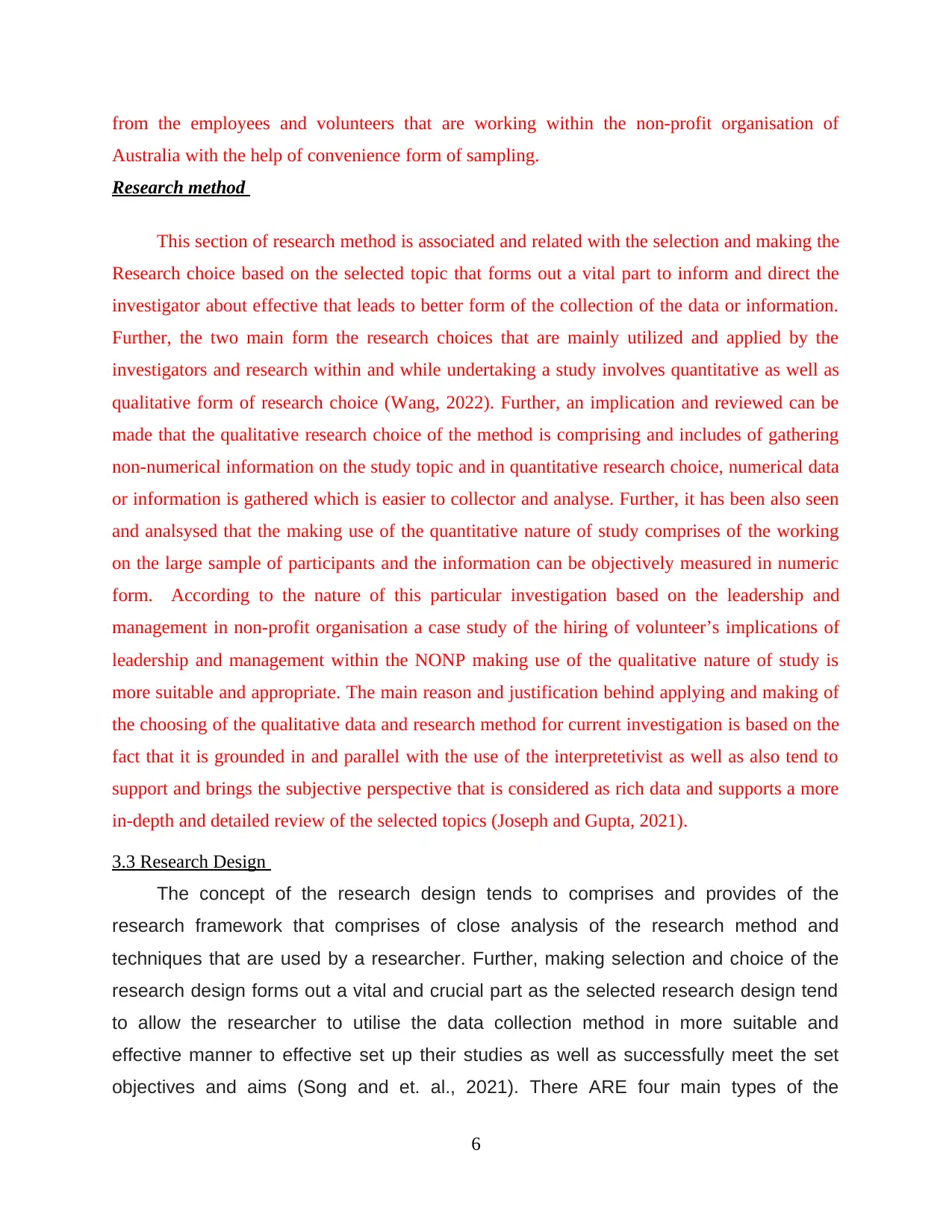
from the employees and volunteers that are working within the non-profit organisation of
Australia with the help of convenience form of sampling.
Research method
This section of research method is associated and related with the selection and making the
Research choice based on the selected topic that forms out a vital part to inform and direct the
investigator about effective that leads to better form of the collection of the data or information.
Further, the two main form the research choices that are mainly utilized and applied by the
investigators and research within and while undertaking a study involves quantitative as well as
qualitative form of research choice (Wang, 2022). Further, an implication and reviewed can be
made that the qualitative research choice of the method is comprising and includes of gathering
non-numerical information on the study topic and in quantitative research choice, numerical data
or information is gathered which is easier to collector and analyse. Further, it has been also seen
and analsysed that the making use of the quantitative nature of study comprises of the working
on the large sample of participants and the information can be objectively measured in numeric
form. According to the nature of this particular investigation based on the leadership and
management in non-profit organisation a case study of the hiring of volunteer’s implications of
leadership and management within the NONP making use of the qualitative nature of study is
more suitable and appropriate. The main reason and justification behind applying and making of
the choosing of the qualitative data and research method for current investigation is based on the
fact that it is grounded in and parallel with the use of the interpretetivist as well as also tend to
support and brings the subjective perspective that is considered as rich data and supports a more
in-depth and detailed review of the selected topics (Joseph and Gupta, 2021).
3.3 Research Design
The concept of the research design tends to comprises and provides of the
research framework that comprises of close analysis of the research method and
techniques that are used by a researcher. Further, making selection and choice of the
research design forms out a vital and crucial part as the selected research design tend
to allow the researcher to utilise the data collection method in more suitable and
effective manner to effective set up their studies as well as successfully meet the set
objectives and aims (Song and et. al., 2021). There ARE four main types of the
6
Australia with the help of convenience form of sampling.
Research method
This section of research method is associated and related with the selection and making the
Research choice based on the selected topic that forms out a vital part to inform and direct the
investigator about effective that leads to better form of the collection of the data or information.
Further, the two main form the research choices that are mainly utilized and applied by the
investigators and research within and while undertaking a study involves quantitative as well as
qualitative form of research choice (Wang, 2022). Further, an implication and reviewed can be
made that the qualitative research choice of the method is comprising and includes of gathering
non-numerical information on the study topic and in quantitative research choice, numerical data
or information is gathered which is easier to collector and analyse. Further, it has been also seen
and analsysed that the making use of the quantitative nature of study comprises of the working
on the large sample of participants and the information can be objectively measured in numeric
form. According to the nature of this particular investigation based on the leadership and
management in non-profit organisation a case study of the hiring of volunteer’s implications of
leadership and management within the NONP making use of the qualitative nature of study is
more suitable and appropriate. The main reason and justification behind applying and making of
the choosing of the qualitative data and research method for current investigation is based on the
fact that it is grounded in and parallel with the use of the interpretetivist as well as also tend to
support and brings the subjective perspective that is considered as rich data and supports a more
in-depth and detailed review of the selected topics (Joseph and Gupta, 2021).
3.3 Research Design
The concept of the research design tends to comprises and provides of the
research framework that comprises of close analysis of the research method and
techniques that are used by a researcher. Further, making selection and choice of the
research design forms out a vital and crucial part as the selected research design tend
to allow the researcher to utilise the data collection method in more suitable and
effective manner to effective set up their studies as well as successfully meet the set
objectives and aims (Song and et. al., 2021). There ARE four main types of the
6
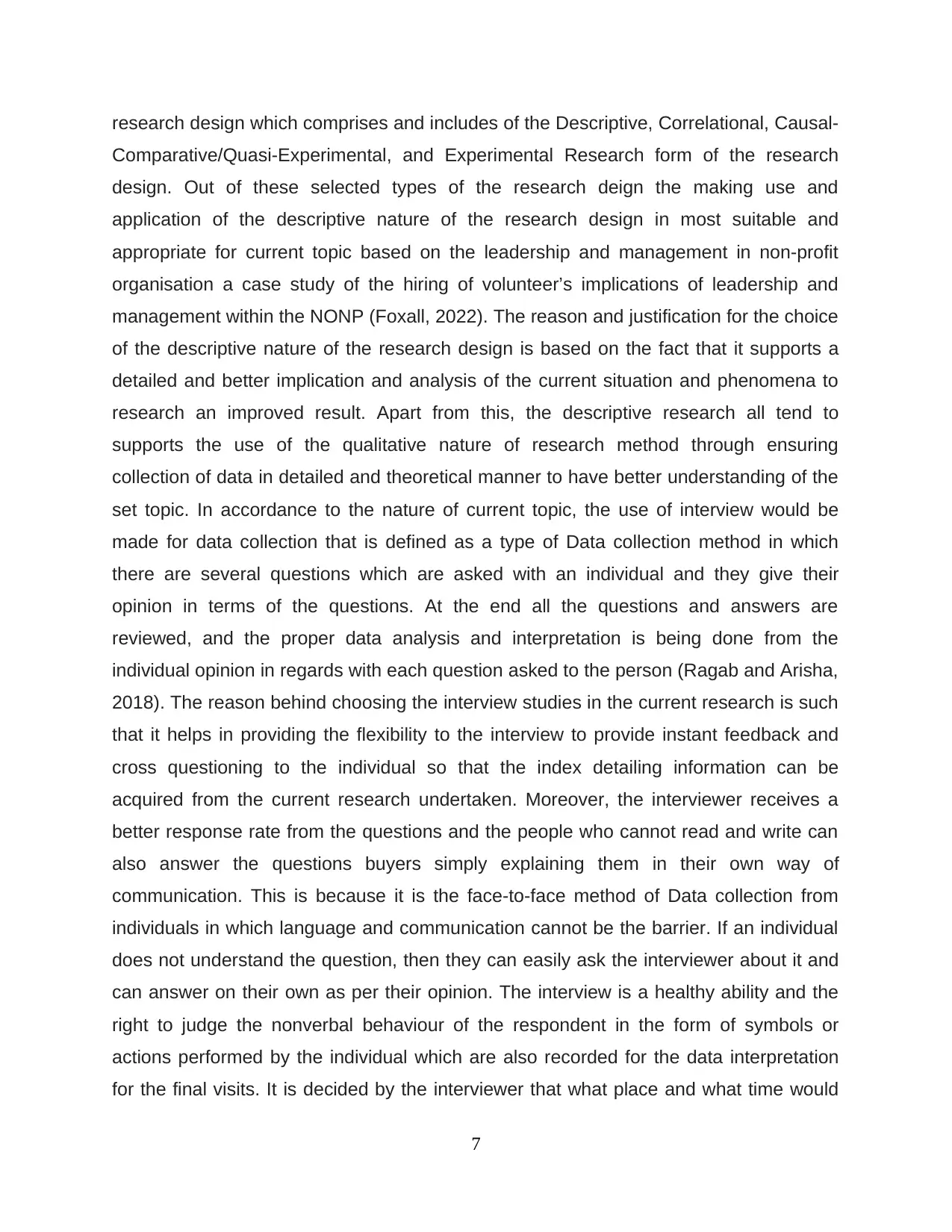
research design which comprises and includes of the Descriptive, Correlational, Causal-
Comparative/Quasi-Experimental, and Experimental Research form of the research
design. Out of these selected types of the research deign the making use and
application of the descriptive nature of the research design in most suitable and
appropriate for current topic based on the leadership and management in non-profit
organisation a case study of the hiring of volunteer’s implications of leadership and
management within the NONP (Foxall, 2022). The reason and justification for the choice
of the descriptive nature of the research design is based on the fact that it supports a
detailed and better implication and analysis of the current situation and phenomena to
research an improved result. Apart from this, the descriptive research all tend to
supports the use of the qualitative nature of research method through ensuring
collection of data in detailed and theoretical manner to have better understanding of the
set topic. In accordance to the nature of current topic, the use of interview would be
made for data collection that is defined as a type of Data collection method in which
there are several questions which are asked with an individual and they give their
opinion in terms of the questions. At the end all the questions and answers are
reviewed, and the proper data analysis and interpretation is being done from the
individual opinion in regards with each question asked to the person (Ragab and Arisha,
2018). The reason behind choosing the interview studies in the current research is such
that it helps in providing the flexibility to the interview to provide instant feedback and
cross questioning to the individual so that the index detailing information can be
acquired from the current research undertaken. Moreover, the interviewer receives a
better response rate from the questions and the people who cannot read and write can
also answer the questions buyers simply explaining them in their own way of
communication. This is because it is the face-to-face method of Data collection from
individuals in which language and communication cannot be the barrier. If an individual
does not understand the question, then they can easily ask the interviewer about it and
can answer on their own as per their opinion. The interview is a healthy ability and the
right to judge the nonverbal behaviour of the respondent in the form of symbols or
actions performed by the individual which are also recorded for the data interpretation
for the final visits. It is decided by the interviewer that what place and what time would
7
Comparative/Quasi-Experimental, and Experimental Research form of the research
design. Out of these selected types of the research deign the making use and
application of the descriptive nature of the research design in most suitable and
appropriate for current topic based on the leadership and management in non-profit
organisation a case study of the hiring of volunteer’s implications of leadership and
management within the NONP (Foxall, 2022). The reason and justification for the choice
of the descriptive nature of the research design is based on the fact that it supports a
detailed and better implication and analysis of the current situation and phenomena to
research an improved result. Apart from this, the descriptive research all tend to
supports the use of the qualitative nature of research method through ensuring
collection of data in detailed and theoretical manner to have better understanding of the
set topic. In accordance to the nature of current topic, the use of interview would be
made for data collection that is defined as a type of Data collection method in which
there are several questions which are asked with an individual and they give their
opinion in terms of the questions. At the end all the questions and answers are
reviewed, and the proper data analysis and interpretation is being done from the
individual opinion in regards with each question asked to the person (Ragab and Arisha,
2018). The reason behind choosing the interview studies in the current research is such
that it helps in providing the flexibility to the interview to provide instant feedback and
cross questioning to the individual so that the index detailing information can be
acquired from the current research undertaken. Moreover, the interviewer receives a
better response rate from the questions and the people who cannot read and write can
also answer the questions buyers simply explaining them in their own way of
communication. This is because it is the face-to-face method of Data collection from
individuals in which language and communication cannot be the barrier. If an individual
does not understand the question, then they can easily ask the interviewer about it and
can answer on their own as per their opinion. The interview is a healthy ability and the
right to judge the nonverbal behaviour of the respondent in the form of symbols or
actions performed by the individual which are also recorded for the data interpretation
for the final visits. It is decided by the interviewer that what place and what time would
7
⊘ This is a preview!⊘
Do you want full access?
Subscribe today to unlock all pages.

Trusted by 1+ million students worldwide
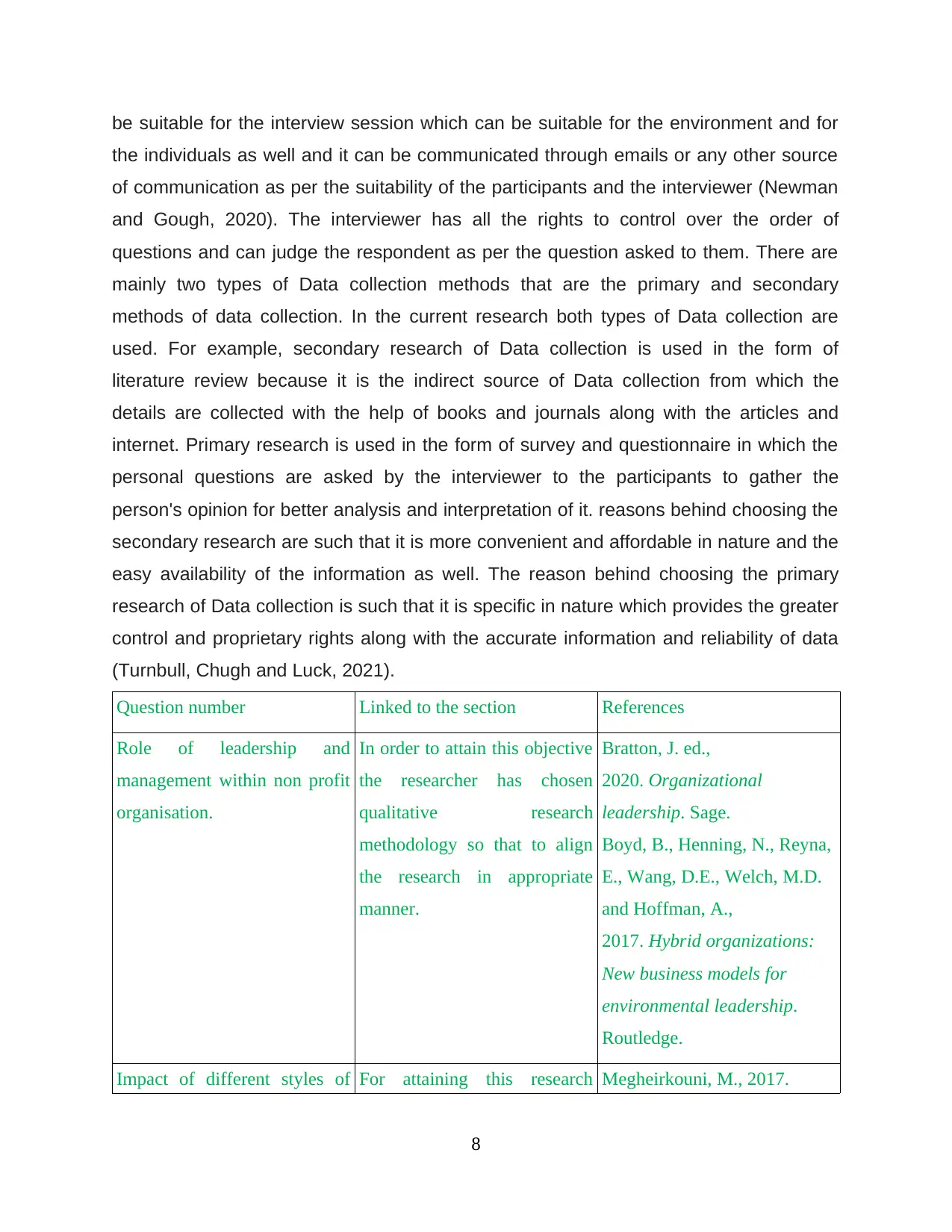
be suitable for the interview session which can be suitable for the environment and for
the individuals as well and it can be communicated through emails or any other source
of communication as per the suitability of the participants and the interviewer (Newman
and Gough, 2020). The interviewer has all the rights to control over the order of
questions and can judge the respondent as per the question asked to them. There are
mainly two types of Data collection methods that are the primary and secondary
methods of data collection. In the current research both types of Data collection are
used. For example, secondary research of Data collection is used in the form of
literature review because it is the indirect source of Data collection from which the
details are collected with the help of books and journals along with the articles and
internet. Primary research is used in the form of survey and questionnaire in which the
personal questions are asked by the interviewer to the participants to gather the
person's opinion for better analysis and interpretation of it. reasons behind choosing the
secondary research are such that it is more convenient and affordable in nature and the
easy availability of the information as well. The reason behind choosing the primary
research of Data collection is such that it is specific in nature which provides the greater
control and proprietary rights along with the accurate information and reliability of data
(Turnbull, Chugh and Luck, 2021).
Question number Linked to the section References
Role of leadership and
management within non profit
organisation.
In order to attain this objective
the researcher has chosen
qualitative research
methodology so that to align
the research in appropriate
manner.
Bratton, J. ed.,
2020. Organizational
leadership. Sage.
Boyd, B., Henning, N., Reyna,
E., Wang, D.E., Welch, M.D.
and Hoffman, A.,
2017. Hybrid organizations:
New business models for
environmental leadership.
Routledge.
Impact of different styles of For attaining this research Megheirkouni, M., 2017.
8
the individuals as well and it can be communicated through emails or any other source
of communication as per the suitability of the participants and the interviewer (Newman
and Gough, 2020). The interviewer has all the rights to control over the order of
questions and can judge the respondent as per the question asked to them. There are
mainly two types of Data collection methods that are the primary and secondary
methods of data collection. In the current research both types of Data collection are
used. For example, secondary research of Data collection is used in the form of
literature review because it is the indirect source of Data collection from which the
details are collected with the help of books and journals along with the articles and
internet. Primary research is used in the form of survey and questionnaire in which the
personal questions are asked by the interviewer to the participants to gather the
person's opinion for better analysis and interpretation of it. reasons behind choosing the
secondary research are such that it is more convenient and affordable in nature and the
easy availability of the information as well. The reason behind choosing the primary
research of Data collection is such that it is specific in nature which provides the greater
control and proprietary rights along with the accurate information and reliability of data
(Turnbull, Chugh and Luck, 2021).
Question number Linked to the section References
Role of leadership and
management within non profit
organisation.
In order to attain this objective
the researcher has chosen
qualitative research
methodology so that to align
the research in appropriate
manner.
Bratton, J. ed.,
2020. Organizational
leadership. Sage.
Boyd, B., Henning, N., Reyna,
E., Wang, D.E., Welch, M.D.
and Hoffman, A.,
2017. Hybrid organizations:
New business models for
environmental leadership.
Routledge.
Impact of different styles of For attaining this research Megheirkouni, M., 2017.
8
Paraphrase This Document
Need a fresh take? Get an instant paraphrase of this document with our AI Paraphraser
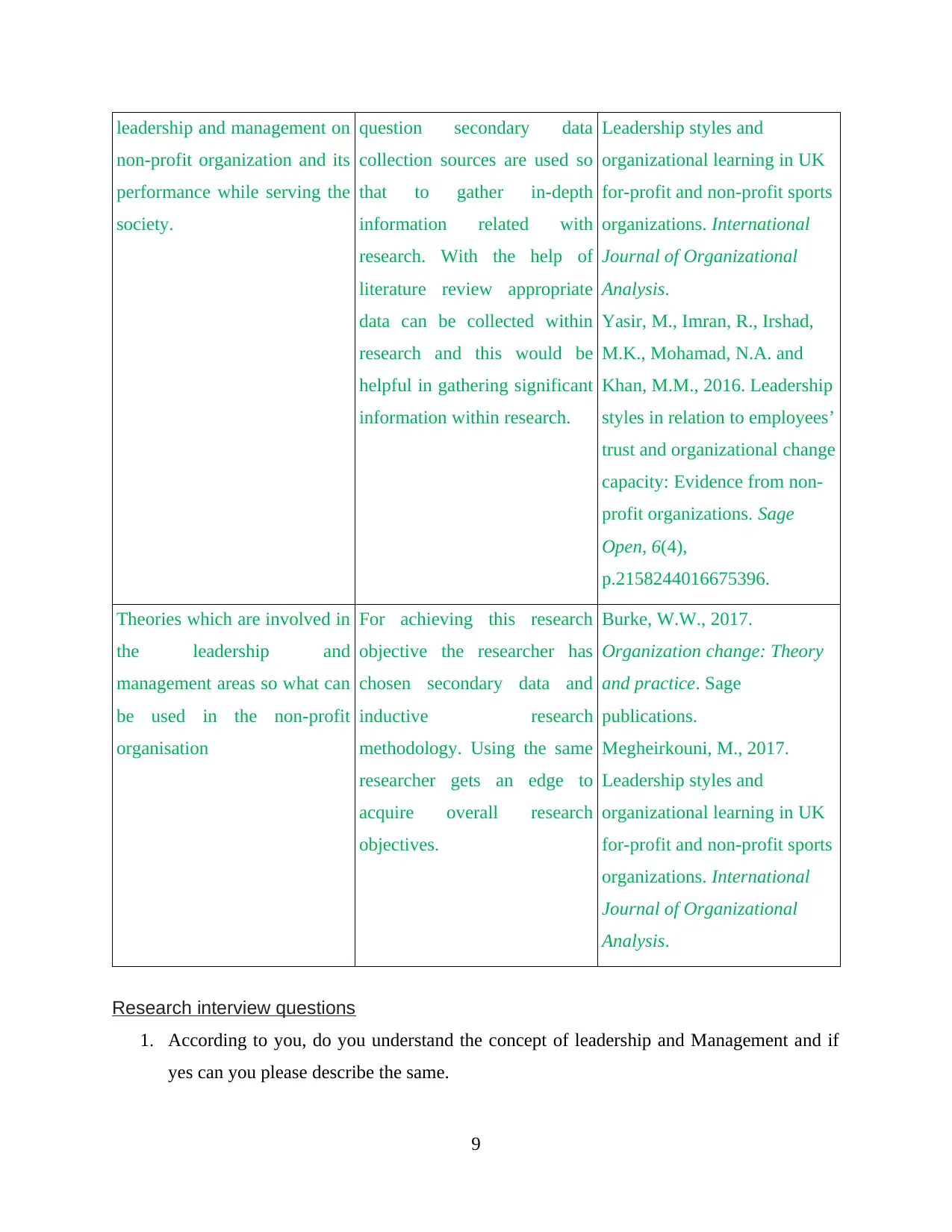
leadership and management on
non-profit organization and its
performance while serving the
society.
question secondary data
collection sources are used so
that to gather in-depth
information related with
research. With the help of
literature review appropriate
data can be collected within
research and this would be
helpful in gathering significant
information within research.
Leadership styles and
organizational learning in UK
for-profit and non-profit sports
organizations. International
Journal of Organizational
Analysis.
Yasir, M., Imran, R., Irshad,
M.K., Mohamad, N.A. and
Khan, M.M., 2016. Leadership
styles in relation to employees’
trust and organizational change
capacity: Evidence from non-
profit organizations. Sage
Open, 6(4),
p.2158244016675396.
Theories which are involved in
the leadership and
management areas so what can
be used in the non-profit
organisation
For achieving this research
objective the researcher has
chosen secondary data and
inductive research
methodology. Using the same
researcher gets an edge to
acquire overall research
objectives.
Burke, W.W., 2017.
Organization change: Theory
and practice. Sage
publications.
Megheirkouni, M., 2017.
Leadership styles and
organizational learning in UK
for-profit and non-profit sports
organizations. International
Journal of Organizational
Analysis.
Research interview questions
1. According to you, do you understand the concept of leadership and Management and if
yes can you please describe the same.
9
non-profit organization and its
performance while serving the
society.
question secondary data
collection sources are used so
that to gather in-depth
information related with
research. With the help of
literature review appropriate
data can be collected within
research and this would be
helpful in gathering significant
information within research.
Leadership styles and
organizational learning in UK
for-profit and non-profit sports
organizations. International
Journal of Organizational
Analysis.
Yasir, M., Imran, R., Irshad,
M.K., Mohamad, N.A. and
Khan, M.M., 2016. Leadership
styles in relation to employees’
trust and organizational change
capacity: Evidence from non-
profit organizations. Sage
Open, 6(4),
p.2158244016675396.
Theories which are involved in
the leadership and
management areas so what can
be used in the non-profit
organisation
For achieving this research
objective the researcher has
chosen secondary data and
inductive research
methodology. Using the same
researcher gets an edge to
acquire overall research
objectives.
Burke, W.W., 2017.
Organization change: Theory
and practice. Sage
publications.
Megheirkouni, M., 2017.
Leadership styles and
organizational learning in UK
for-profit and non-profit sports
organizations. International
Journal of Organizational
Analysis.
Research interview questions
1. According to you, do you understand the concept of leadership and Management and if
yes can you please describe the same.
9
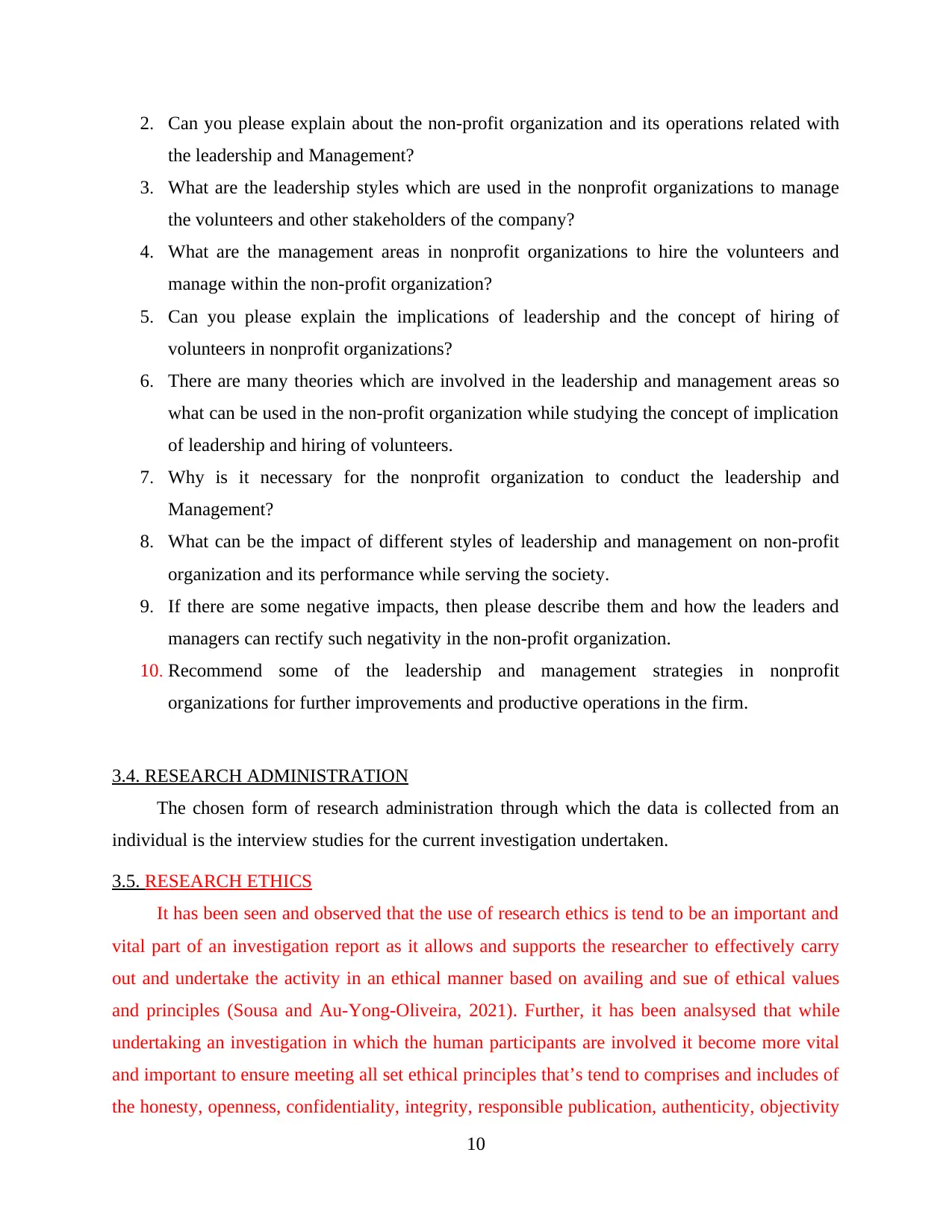
2. Can you please explain about the non-profit organization and its operations related with
the leadership and Management?
3. What are the leadership styles which are used in the nonprofit organizations to manage
the volunteers and other stakeholders of the company?
4. What are the management areas in nonprofit organizations to hire the volunteers and
manage within the non-profit organization?
5. Can you please explain the implications of leadership and the concept of hiring of
volunteers in nonprofit organizations?
6. There are many theories which are involved in the leadership and management areas so
what can be used in the non-profit organization while studying the concept of implication
of leadership and hiring of volunteers.
7. Why is it necessary for the nonprofit organization to conduct the leadership and
Management?
8. What can be the impact of different styles of leadership and management on non-profit
organization and its performance while serving the society.
9. If there are some negative impacts, then please describe them and how the leaders and
managers can rectify such negativity in the non-profit organization.
10. Recommend some of the leadership and management strategies in nonprofit
organizations for further improvements and productive operations in the firm.
3.4. RESEARCH ADMINISTRATION
The chosen form of research administration through which the data is collected from an
individual is the interview studies for the current investigation undertaken.
3.5. RESEARCH ETHICS
It has been seen and observed that the use of research ethics is tend to be an important and
vital part of an investigation report as it allows and supports the researcher to effectively carry
out and undertake the activity in an ethical manner based on availing and sue of ethical values
and principles (Sousa and Au-Yong-Oliveira, 2021). Further, it has been analsysed that while
undertaking an investigation in which the human participants are involved it become more vital
and important to ensure meeting all set ethical principles that’s tend to comprises and includes of
the honesty, openness, confidentiality, integrity, responsible publication, authenticity, objectivity
10
the leadership and Management?
3. What are the leadership styles which are used in the nonprofit organizations to manage
the volunteers and other stakeholders of the company?
4. What are the management areas in nonprofit organizations to hire the volunteers and
manage within the non-profit organization?
5. Can you please explain the implications of leadership and the concept of hiring of
volunteers in nonprofit organizations?
6. There are many theories which are involved in the leadership and management areas so
what can be used in the non-profit organization while studying the concept of implication
of leadership and hiring of volunteers.
7. Why is it necessary for the nonprofit organization to conduct the leadership and
Management?
8. What can be the impact of different styles of leadership and management on non-profit
organization and its performance while serving the society.
9. If there are some negative impacts, then please describe them and how the leaders and
managers can rectify such negativity in the non-profit organization.
10. Recommend some of the leadership and management strategies in nonprofit
organizations for further improvements and productive operations in the firm.
3.4. RESEARCH ADMINISTRATION
The chosen form of research administration through which the data is collected from an
individual is the interview studies for the current investigation undertaken.
3.5. RESEARCH ETHICS
It has been seen and observed that the use of research ethics is tend to be an important and
vital part of an investigation report as it allows and supports the researcher to effectively carry
out and undertake the activity in an ethical manner based on availing and sue of ethical values
and principles (Sousa and Au-Yong-Oliveira, 2021). Further, it has been analsysed that while
undertaking an investigation in which the human participants are involved it become more vital
and important to ensure meeting all set ethical principles that’s tend to comprises and includes of
the honesty, openness, confidentiality, integrity, responsible publication, authenticity, objectivity
10
⊘ This is a preview!⊘
Do you want full access?
Subscribe today to unlock all pages.

Trusted by 1+ million students worldwide
1 out of 16
Related Documents
Your All-in-One AI-Powered Toolkit for Academic Success.
+13062052269
info@desklib.com
Available 24*7 on WhatsApp / Email
![[object Object]](/_next/static/media/star-bottom.7253800d.svg)
Unlock your academic potential
Copyright © 2020–2026 A2Z Services. All Rights Reserved. Developed and managed by ZUCOL.




